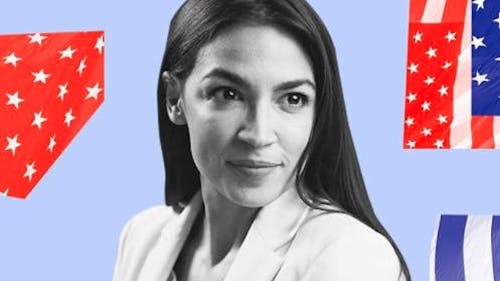In hopes for 'blue wave,' how Progressives are defining midterms

Staying true to political history, polling seems to indicate that the president’s opposition party will make big gains this November. In this round of midterms, that means the Democratic Party is prepping for a return to (some) political power. For many, the anticipated “blue wave” will serve as a clear attempt to hamper the Trump administration, and to restore some parity to Washington, D.C. This zero-sum game approach means that many Democratic nominees are banking to win on the simple basis that there’s a “D” next to their name instead of an “R." Still, something else has emerged in this election cycle: full-fledged progressive politicians gaining more ground than ever.
As the mainstream narrative since 2016 has solely been “oppose Trump,” there hasn’t been a full diagnosis of the sweeping differences that exist in the Democratic Party. Of course there’s Vermont Sen. Bernie Sanders, who identifies as a Democratic Socialist. Running on a platform of wide social programs like Medicare For All and free community college nationwide, he’s about as far left as the party currently seems to be able to handle. Then, there’s West Virginia Sen. Joe Manchin (D), who voted for Supreme Court Justice Brett Kavanaugh and said that Trump’s idea to terminate birthright citizenship was “worthy of looking at.” Filling in the middle ground are staunch centrists like Rep. Nancy Pelosi (D-Minority Leader) and Sen. Chuck Schumer (D-N.Y.).
This cycle, more politicians have been leaning farther Left than ever, and unabashedly so. These “progressives” aren’t a party and don’t see eye to eye on many issues, but they’ve shaking up the political landscape in many ways. New York House nominee Alexandria Ocasio-Cortez has taken the political world by storm since unseating Rep. Joe Crowley (R-N.J.), a 20-year incumbent. An open Democratic Socialist, she’s fully on board with with the Sanders platform, and proudly ran a campaign with no corporate support. In Texas, Congressman Beto O’Rourke is also quick to note his lack of financial support outside of small-dollar donations. He’s much closer to the political center than Cortez, but a Democrat in Texas making any sort of noise is big news. There are plenty of politicians borrowing from both playbooks.
In Florida, gubernatorial candidate Mayor Andrew Gillum (D) is fairly progressive on paper while still taking advantage of funding and mainstream Democrat support. Around the country, politicians are trying to shift public opinion toward the playbook of Sanders instead of Schumer. They are widely supported by younger Democrats, and the growing movement away from corporate finance is drawing in many young Independents. It’s caught on so much that fairly mainstream politicians like Sen. Cory Booker (D-N.J.) and Sen. Kirsten Gillibrand (D-N.Y.) have been ditching corporate PAC money ahead of their probable 2020 presidential runs.
Appeals for cost-reduced college resonates, of course, with college students and recent graduates. Wider healthcare coverage is polling well across all age groups and federal marijuana legalization has been a bipartisan majority opinion for many years now. The constantly deteriorating environment is also a clear point of interest and preservation is a clearly Left-wing ideal. Along with all these changes, it increasingly seems like Left-leaning ideologies like socialism are escaping the taboo that have held them to the fringe since the days of McCarthyism.
Still, this might be putting the carriage before the horse. In New Jersey, many self-proclaimed “progressives” will have to hold their nose while they vote for Sen. Bob Menendez, who passes the smell test for political corruption at every turn. Progressives, whether self-declared or not, are still a small portion of the national party. Politicians like Manchin still exist. Post-midterms, “blue wave” or not, the Democratic Party will have to come to terms with the growing divide inside their own party. With all that’s at stake in 2020, they need more of an identity than simply “anti-Trump."
Aylin Üncü, a School of Arts and Sciences senior, said she understands the importance of the election but also implores Democrats to do better. “I’m moderately positive about voting this year because there’s a chance for Democrats to take back congress, but there are plenty of problems within the Democratic party pertaining to what they actually represent."
Having participated in a video to register students by RU Voting, she’s confident that the big media push this cycle will garner youth involvement. Still, Üncü is pushing for more. “The midterm elections are a chance to help stabilize America, but until there’s equal representation and politicians who aren’t corrupt, we have a long way to go," Üncü said.



